初中英语基础知识(11)
外研版初中九年级上册英语 Module 11 知识点总结
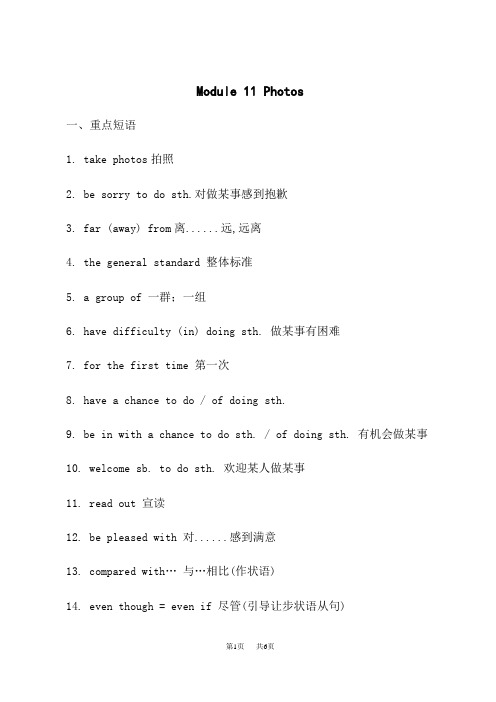
Module 11 Photos一、重点短语1. take photos拍照2. be sorry to do sth.对做某事感到抱歉3. far (away) from离......远,远离4. the general standard 整体标准5. a group of 一群;一组6. have difficulty (in) doing sth. 做某事有困难7. for the first time 第一次8. have a chance to do / of doing sth.9. be in with a chance to do sth. / of doing sth. 有机会做某事10. welcome sb. to do sth. 欢迎某人做某事11. read out 宣读12. be pleased with 对......感到满意13. compared with…与…相比(作状语)14. even though = even if 尽管(引导让步状语从句)15. give prize to sb. 给某人颁奖16. protect…against /from…保护…免受…17. present the prizes to sb. 给某人颁奖18. congratulations to sb. 向某人祝贺19. congratulations on sth. 为某事祝贺20. congratulate sb. on sth. 为某事向某人祝贺21. enter the competition 参加比赛22. win the competition 赢得比赛23. manage to do sth.设法做某事二、固定结构You bet. = sure = of course = certainly 当然。
It doesn’t matter. 没关系。
more than happy = very happy 非常开心be used to doing sth.习惯于干某事thanks to sb. 向某人表示感谢thanks to = because of 幸亏;由于I have a feeling that 我有种感觉protect +宾语+against保护......; 使......不受三.重点句型:1. Why don’t you do...? 为什么不做2. What about doing sth.? 做某事怎么样3. Would /Do you mind sb. / one’s doing sth.? 你介意某人做某事吗?Would you mind me / my opening the window? 你介意我打开窗户吗?4. The trouble is, I want to get some good photos, but I can't see over people's heads. 麻烦的是,我想得拍一些好照片,但是,我不能越过人们的头顶看见别人。
(完整版)人教版初中英语9年级全一册Unit11知识清单+习题(包含答案)
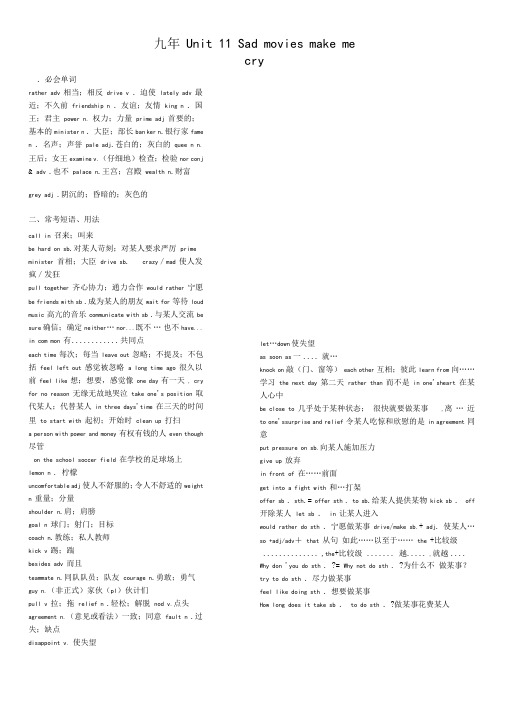
let …down 使失望 as soon as 一 .... 就…knock on 敲(门、窗等) each other 互相;彼此 learn from 向……学习 the next day 第二天 rather than 而不是 in one 'sheart 在某人心中be close to 几乎处于某种状态; 很快就要做某事,离 … 近to one 'ssurprise and relief 令某人吃惊和欣慰的是 in agreement 同意put pressure on sb.向某人施加压力 give up 放弃in front of 在……前面 get into a fight with 和…打架offer sb . sth .= offer sth . to sb .给某人提供某物 kick sb . off开除某人 let sb . in 让某人进入would rather do sth .宁愿做某事 drive /make sb.+ adj . 使某人… so +adj/adv + that 从句 如此……以至于…… the +比较级.............. ,the +比较级 ....... 越..... ,就越 ....Why don 'you do sth . ?= Why not do sth . ?为什么不 做某事? try to do sth .尽力做某事 feel like doing sth .想要做某事How long does it take sb . to do sth .?做某事花费某人九年 Unit 11 Sad movies make mecry.必会单词rather adv 相当;相反 drive v .迫使 lately adv 最近;不久前 friendship n .友谊;友情 king n .国王;君主 power n. 权力;力量 prime adj 首要的;基本的 minister n .大臣;部长 ban ker n .银行家 famen .名声;声誉 pale adj .苍白的;灰白的 quee n n.王后;女王 examine v.(仔细地)检查;检验 nor conj & adv .也不 palace n .王宫;宫殿 wealth n .财富grey adj .阴沉的;昏暗的;灰色的二、常考短语、用法call in 召来;叫来be hard on sb .对某人苛刻;对某人要求严厉 prime minister 首相;大臣 drive sb .crazy /mad 使人发疯/发狂pull together 齐心协力;通力合作 would rather 宁愿 be friends with sb .成为某人的朋友 wait for 等待 loud music 高亢的音乐 communicate with sb .与某人交流 be sure 确信;确定 neither … nor...既不 … 也不 have... in com mon 有 ............ 共同点each time 每次;每当 leave out 忽略;不提及;不包括 feel left out 感觉被忽略 a long time ago 很久以前 feel like 想;想要,感觉像 one day 有一天 , cryfor no reason 无缘无故地哭泣 take one 's position 取代某人;代替某人 in three days 'time 在三天的时间里 to start with 起初;开始时 clean up 打扫a person with power and money 有权有钱的人 even though尽管on the school soccer field 在学校的足球场上 lemon n . 柠檬uncomfortable adj 使人不舒服的;令人不舒适的 weight n 重量;分量 shoulder n .肩;肩膀 goal n 球门;射门;目标 coach n .教练;私人教师 kick v 踢;踹 besides adv 而且teammate n .同队队员;队友 courage n .勇敢;勇气 guy n.(非正式)家伙(pl )伙计们pull v 拉;拖 relief n .轻松;解脱 nod v.点头 agreement n.(意见或看法)一致;同意 fault n .过失;缺点disappoint v. 使失望多长时间?make sb. do sth.使/让某人做某事stop doing sth停止做某事drive sb. to do sth.迫使某人做某事miss doing sth .错过做某事be worried about doing sth .担心做某事;为做某事而担hear sb doing sth.听见某人正在做某事心三、经典句型:1.Well, the more I get to know Julie, the more I realize that we have a lot in com mon嗯、我对朱莉了解得越多,越意识到我们有许多共同之处。
初中英语七年级下册Units 11-12知识汇总

Unit 11 How was your school trip?一单元主题分析:本单元是七年级下册第11单元,标题为How was your school trip?话题为school trips ,功能是谈论past events,属于人与自我的范畴。
本单元谈论了学校组织的游览活动,由此二本单元和其他单元之间的联系:本单元初次涉及到一般过去时态,重点讲述了一般过去时的陈述句,否定句,一般疑问句与how 引导的特殊疑问句。
而在后面的U12会继续学习一般过去时的其他特殊疑问句。
一般过去时在初中阶段时很重要的时态,为后续学习过去进行时以及现在完成时打下基础。
四单元教学目标:1.能正确使用be动词的一般过去时描述或询问过去的状态。
2. 能正确使用实义动词的一般过去时描述或询问过去发生的事情。
3.能根据动词过去式推测动词原形,尝试归纳规则动词的过去式的特点及变化规律。
4.能通过阅读本单元两篇日记理解不同人对待同一事物的不同感受.5.了解国内外学校组织的各种游览活动。
Unit 12 What did you do last weekend?一单元主题分析:本单元是七年级下册第12单元,标题为What did you do last weekend?话题为Weekend activities,功能是谈论past events,属于人与自我,人与社会的范畴。
本单元谈论了常见的周末活动,由此让学生进一步掌握一般过去式的用法,尤其是一般过去二本单元和其他单元之间的联系:本单元是七年级下册的最后一个单元,从语法上来说,从语法上来说起到了承上启下的左云初次涉及到一般过去时态,重点讲述了一般过去时的陈述句,否定句,一般疑问句与how 引导的特殊疑问句。
而在后面的U12会继续学习一般过去时的其他特殊疑问句。
一般过去时在初中阶段时很重要的时态,为后续学习过去进行时以及现在完成时打下基础。
四单元教学目标:1.能够听懂关于谈论周末活动的对话内容,培养学生提取关键信息的能力2.用带有who, where, what等特殊疑问词的一般过去时的句子询问信息,并能做出正确的回答。
人教版初中英语七年级下册unit 11 过去式 知识点讲解与练习

人教版初中英语七年级下册unit 11 过去式知识点讲解与练习语法:一般过去时一、什么是一般过去时?一般过去时是用于表述“过去”的时态。
1. 表示过去发生的动作。
2. 表示过去发生的状态。
二、一般现在时与一般过去时的共同点一般过去时的句式在结构上与一般现在时的句式结构是完全相同的。
无论是陈述句还是疑问句均是如此。
因而学好了一般现在时的知识,再学习一般过去时的知识是非常容易的。
一、be动词。
1)肯定句。
I am a student. —> I was a student.You are young. —> You were young.2)否定句。
I am not a student. —> I was not a student.You are not young. —> You were not young.二、实意动词作谓语的情况。
1)肯定句。
I read books in the park. —> I read books in the park.(思考:为何看上去这个例句没有发生任何变化呢?答:因为read的过去式也为read,其拼写虽相同,但读音不同。
)He usually gets up at 7 a.m.—> He usually got up at 7 a.m.(注意:一般过去时中没有所谓的“三单变化规则”,因为一般过去时是没有人称和数的变化的)She helps me with my homework.—> She helped me with my homework.They want to ask you a question.—> They wanted to ask you a question.总结:此类结构中,将单独作谓语的实意动词变为其过去式,句子的时态即变成了一般过去时。
(实意动词单独作谓语的一般过去时没有人称和数的变化。
非谓语动词知识点详解(初中英语专项复习)11

非谓语动词知识点详解(初中英语专项复习)1. 动词不定式(1)动词不定式的构成:不定式的基本形式为:to+动词原形,有时可以不用to,这里的to 是不定式符号,本身无词义,动词不定式的否定形式是not+(to+)动词原形。
(2)动词不定式的句法功能:1)不定式作主语动词不定式作主语时,常用it作形式主语,而将真正的主语放在句末,其结构为:It + be + adj. +(for/of sb. )+动词不定式。
如:To learn English well is useful.→ It is useful to learn English well.学好英语很有用。
It’s important for us to protect the environment.保护环境对我们来说很重要。
在kind,good,nice,clever等表示人的品质的形容词后,不用for而用of。
如:It’s very kind of you to help me.你帮助我真是太好啦。
It’s very clever of you to do like that.你那样做真是太聪明啦!2)不定式作宾语①一些谓语动词后只能用不定式作宾语,常见的这类词是表示命令、打算或希望的,如:would like,like,want,wish,hope,decide,plan,expect等。
如:Would you like to see a film this evening?你今晚想去看电影吗?①在find,think后跟不定式作宾语时,常用it代替,而将真正的宾语放在句末。
如:I find it easy to read English every day.我发现每天读英语很容易。
①常见的一些不带to的动词不定式:why not do...,why don’t you do...,had better(not) do...,would rather do,could/would/will you please(not) do...如:I would rather stay in the room.我宁愿待在房间里。
Unit 11知识点人教版九年级英语下册
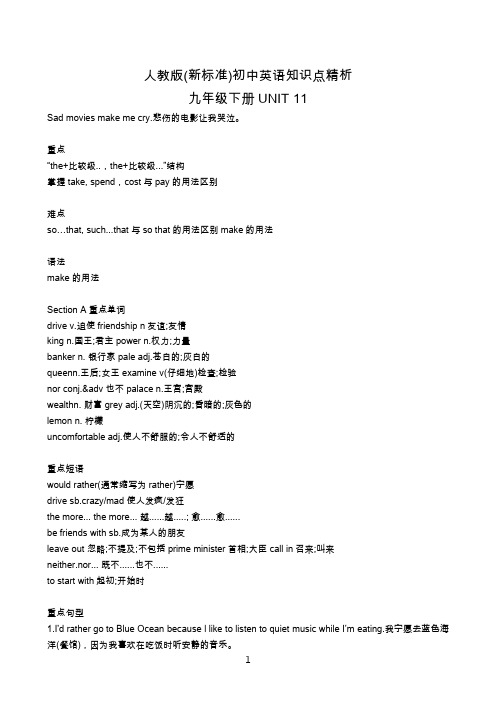
人教版(新标准)初中英语知识点精析九年级下册UNIT 11Sad movies make me cry.悲伤的电影让我哭泣。
重点“the+比较级..,the+比较级...”结构掌握take, spend,cost与pay的用法区别难点so…that, such...that 与so that的用法区别 make的用法语法make的用法Section A重点单词drive v.迫使 friendship n友谊;友情king n.国王;君主 power n.权力;力量banker n. 银行家 pale adj.苍白的;灰白的queenn.王后;女王 examine v(仔细地)检查;检验nor conj.&adv也不 palace n.王宫;宫殿wealthn. 财富 grey adj.(天空)阴沉的;昏暗的;灰色的lemon n. 柠檬uncomfortable adj.使人不舒服的;令人不舒适的重点短语would rather(通常缩写为rather)宁愿drive sb.crazy/mad 使人发疯/发狂the more... the more... 越......越.....; 愈......愈......be friends with sb.成为某人的朋友leave out 忽略;不提及;不包括 prime minister首相;大臣 call in召来;叫来neither.nor... 既不......也不......to start with起初;开始时重点句型1.I'd rather go to Blue Ocean because l like to listen to quiet music while I’m eating.我宁愿去蓝色海洋(餐馆),因为我喜欢在吃饭时听安静的音乐。
2.I think ‘ ve made Alice mad and i'm not sure what to do about it我想我已经使艾丽斯发疯了,我不确定对这件事该做什么。
外研版初中英语七下Module 11 自学(译文知识点)
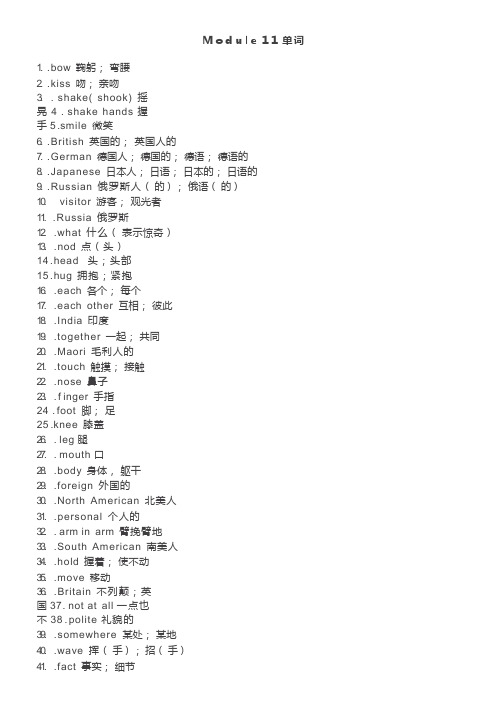
M o d u l e 1 1 单词1.. bow 鞠躬;弯腰2.. kiss 吻;亲吻3.. shake( shook) 摇晃4 . shake hands 握手5 .smile 微笑6.. British 英国的;英国人的7.. German 德国人;德国的;德语;德语的8.. Japanese 日本人;日语;日本的;日语的9.. Russian 俄罗斯人(的);俄语(的)10.visitor 游客;观光者11.. Russia 俄罗斯12.. what 什么(表示惊奇)13.. n od 点(头)14 .h ead 头;头部15 .h ug 拥抱;紧抱16.. each 各个;每个17.. each other 互相;彼此18.. India 印度19.. together 一起;共同20.. Maori 毛利人的21.. touch 触摸;接触22.. nose 鼻子23.. f inger 手指24 . foot 脚;足25 .knee 膝盖26.. leg 腿27.. mouth 口28.. body 身体,躯干29.. foreign 外国的30.. North American 北美人31.. personal 个人的32.. arm in arm 臂挽臂地33.. South American 南美人34.. hold 握着;使不动35.. move 移动36.. B ritain 不列颠;英国37 . not at all 一点也不38 . polite 礼貌的39.. somewhere 某处;某地40.. wave 挥(手);招(手)41.. fact 事实;细节42.. in fact 事实上43.. rude 粗鲁的;无礼的44.. bring 带来【对话翻译】玲玲:明天我们学校将会有些俄罗斯教师来访,我要去迎接来访者。
我该怎么做呢?贝蒂:玲玲,你知道的,在俄罗斯,人们通常亲吻三次,左、右、左。
初中英语考点总结(精选11篇)
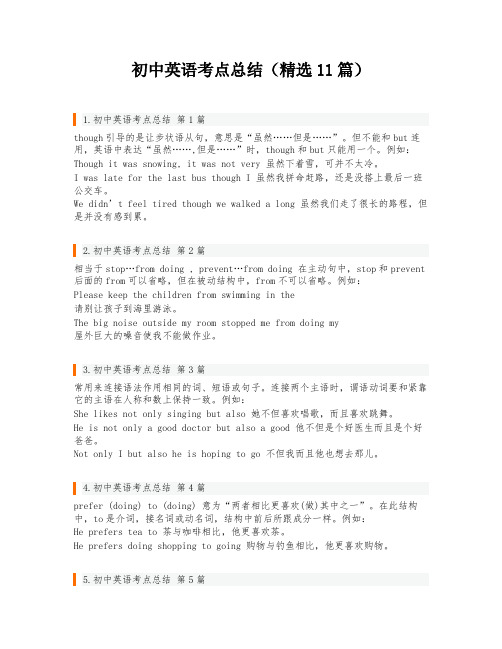
初中英语考点总结(精选11篇)1.初中英语考点总结第1篇though引导的是让步状语从句,意思是“虽然……但是……”。
但不能和but连用,英语中表达“虽然……,但是……”时,though和but只能用一个。
例如:Though it was snowing, it was not very 虽然下着雪,可并不太冷。
I was late for the last bus though I 虽然我拼命赶路,还是没搭上最后一班公交车。
We didn’t feel tired though we walked a long 虽然我们走了很长的路程,但是并没有感到累。
2.初中英语考点总结第2篇相当于stop…from doing , prevent…from doing 在主动句中,stop和prevent 后面的from可以省略,但在被动结构中,from不可以省略。
例如:Please keep the children from swimming in the请别让孩子到海里游泳。
The big noise outside my room stopped me from doing my屋外巨大的噪音使我不能做作业。
3.初中英语考点总结第3篇常用来连接语法作用相同的词、短语或句子。
连接两个主语时,谓语动词要和紧靠它的主语在人称和数上保持一致。
例如:She likes not only singing but also 她不但喜欢唱歌,而且喜欢跳舞。
He is not only a good doctor but also a good 他不但是个好医生而且是个好爸爸。
Not only I but also he is hoping to go 不但我而且他也想去那儿。
4.初中英语考点总结第4篇prefer (doing) to (doing) 意为“两者相比更喜欢(做)其中之一”。
在此结构中,to是介词,接名词或动名词,结构中前后所跟成分一样。
初中英语学习资料 (11)
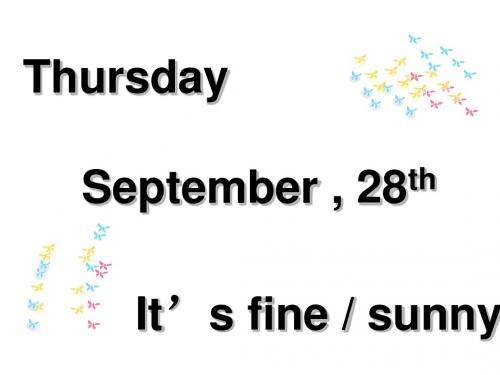
• Found: A backpack. My name is Jack. Phone number 63017047.
• Lost: My notebook. Please call Cindy at 63752148.
请根据下列提示写2篇失物招领启示
1.Grace 的学生证( school ID card )丢了, 她的电话是97852304
Found: ( 1 )
Is this your notebook? ( 3 ) Phone# 235-0285 (5) Found: (1) Please call Mary. (4) Notebook. (2)
Put in order to make a message
My name is Jack. A backpack. Found: Phone number 63017047. at 63752148. Please call Cindy My notebook. Lost:
Jack finds an ID card. He can call ________. Ann’s ring is lost. She can go to ________. Tim’s backpack is lost. He can go to ________.
Put the pieces in order: at 529-6403 ( 4 ) Call David ( 3 ) A set of keys. Please( 2 )
ห้องสมุดไป่ตู้
2.Mary 拣到一件夹克衫, 请失主打电话给88921234
Lost: My school ID card. My name is Grace. Please call 97852304 Found: Is this your jacket? Please call Mary at 88921234.
初中英语八年级上册(U11)专题复习及答案
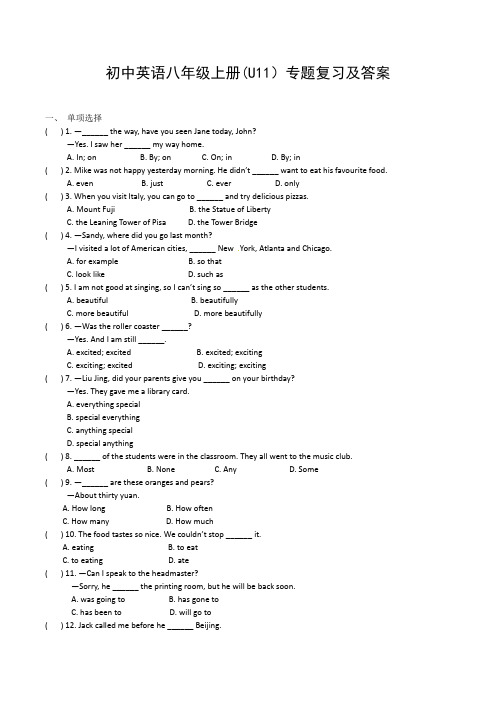
初中英语八年级上册(U11)专题复习及答案一、单项选择( ) 1. —______ the way, have you seen Jane today, John?—Yes. I saw her ______ my way home.A. In; onB. By; onC. On; inD. By; in( ) 2. Mike was not happy yesterday morning. He didn’t ______ want to eat his favourite food.A. evenB. justC. everD. only( ) 3. When you visit Italy, you can go to ______ and try delicious pizzas.A. Mount FujiB. the Statue of LibertyC. the Leaning Tower of PisaD. the Tower Bridge( ) 4. —Sandy, where did you go last month?—I visited a lot of American cities, ______ New York, Atlanta and Chicago.A. for exampleB. so thatC. look likeD. such as( ) 5. I am not good at singing, so I can’t sing so ______ as the other students.A. beautifulB. beautifullyC. more beautifulD. more beautifully( ) 6. —Was the roller coaster ______?—Yes. And I am still ______.A. excited; excitedB. excited; excitingC. exciting; excitedD. exciting; exciting( ) 7. —Liu Jing, did your parents give you ______ on your birthday?—Yes. They gave me a library card.A. everything specialB. special everythingC. anything specialD. special anything( ) 8. ______ of the students were in the classroom. They all went to the music club.A. MostB. NoneC. AnyD. Some( ) 9. —______ are these oranges and pears?—About thirty yuan.A. How longB. How oftenC. How manyD. How much( ) 10. The food tastes so nice. We couldn’t stop ______ it.A. eatingB. to eatC. to eatingD. ate( ) 11. —Can I speak to the headmaster?—Sorry, he ______ the printing room, but he will be back soon.A. was going toB. has gone toC. has been toD. will go to( ) 12. Jack called me before he ______ Beijing.A. left forB. has left forC. left toD. has left to( ) 13. The country life he was used to ______ greatly since 1992.A. changeB. has changedC. changingD. have changed( ) 14. —How long have you been interested in stamps?—______.A. At ten years oldB. At least five years agoC. Since I moved to NanjingD. When I was in Grade 2( ) 15. —I am going on a trip to Hong Kong next week.—Really? ______. Be sure to send me some photos on WeChat.A. That’s greatB. You are welcomeC. That’s all rightD. No problem二、完形填空Each of us makes mistakes from time to time. In fact, we can 16 a lot from our mistakes.Donnie was a 17 student and never answered questions in class. He was 18 to make mistakes. He never finished his homework 19 he didn't want to make any mistakes. Nothing changed 20 Marry Anne, a teacher, came to our 21.One morning, Marry Anne asked Donnie to 22 some questions. After a while Donnie was in tears because he made a mistake. 23 Marry Anne got a box full of erasers from the desk.“Look, Donnie,” she said standing 24 him. “I’ve got something to show you.” She 25 the erasers, one at a time, and put them on the desk.“See these erasers, Donnie?” she continued. “Do you know 26 the erasers become smaller and smaller? That’s because we make mistakes. But we erase the mistakes and try 27 . That’s what you must learn.”“Here,” she said, “I’ll 28 one eraser on your desk, so you will remember that 29may make mistakes.” Donnie looked at Marry Anne and smiled.Donnie 30 a lot from then on. He knew that everyone had the permission to make mistakes as long as you learned them and tried again.( ) 16. A. take B. make C. get D. bring( ) 17. A. good B. shy C. clever D. small( ) 18. A. glad B. excited C. surprised D. afraid( ) 19. A. because B. so C. if D. but( ) 20. A. after B. while C. until D. when( ) 21 A. row B. class C. team D. classroom( ) 22. A. answer B. ask C. give D. have( ) 23. A. Suddenly B. Quickly C. Luckily D. Carefully( ) 24. A. on B. with C. beside D. to( ) 25. A. put out B. took away C. took out D. took off( ) 26. A. when B. how C. what D. why( ) 27. A. more B. again C. another D. one( ) 28. A. forget B. carry C. leave D. give( ) 29. A. nobody B. somebody C. no one D. everybody( ) 30. A. changed B. got C. learned D. Thought三、阅读理解AMaddie came to the playground with Ella. She looked around. It was much bigger than the playground of her old school. The large play set caught her eye.Ella shook her head. “We’re not old enough. Only the fourth graders can play on that. It’s one of the rules of the playground.”It was Maddie’s first day at the new school. She didn’t want to make trouble. But she thought the rule was unfair (不公平的).“Come on. Let’s go on it.” Before Ella could say anything, Maddie took her arm and pulled (拉)her over to it.“Hey, what do you think you’re doing?” a boy on the play set asked. “The fourth graders only. Go and play on the other things.”“No, I think we’ll play here. It is for everyone,” said Maddie.“You must be new, so I’ll tell you the rule,” he said. “The fourth graders play here. The other students play on the other things.”Maddie looked around and asked, “Anyone wants to play on the big play set?” Everyone turned and looked at her. “Come on. Let’s play on it.”The kids came over and played on every part of the play set and everyone had fun. Soon the fourth graders were laughing with all of the other kids.“You kids aren’t so bad,” the boy said to Maddie. “You are good too,” said Maddie. “I’m Maddie, and this is Ella.”“I’m Scott,” said the boy. “See you the same time tomorrow.”“See you.”( ) 31. What rule of the playground did Ella tell Maddie?A. It was open only after class.B. Nobody should fight on the playground.C. Only the students at their school could play there.D. Only the fourth graders could play on the play set.( ) 32. Who probably made the rule of the playground?A. The school.B. Maddie’s teacher.C. The fourth graders.D. All the students at the school.( ) 33. Which of the following is TRUE about Maddie?A. She was new at the school.B. She was in the fourth grade.C. She made trouble at the school.D. She liked to fight with other people.( ) 34. What does the underlined word “It” in Paragraph 6 refer to?A. The school.B. The playground.C. The play set.D. The rule.( ) 35. What would most probably happen after the day?A. Maddie and Scott became classmates.B. Maddie and Scott played together the next day.C. Maddie and Ella got famous all over the school.D. Maddie and Ella had to attend another school.BIt was early summer, and the weather was really hot. Tyler’s mum decided to take him to the beach on Saturday. Tyler was excited. Dad had to work, so he couldn’t go along.It was only a one-hour drive to the beach, but for Tyler it seemed very long. They finally arrived at the beach. Mum found a good place close to water and put their chairs down. A boy about Tyler’s age sat close to them with his mum. He came to Tyler and said his name was Gary. Soon the two boys played together and their mums talked about school, work and family.The boys went to play in water. “Be careful,” shouted Gary’s mum.“We will,” shouted Gary. The boys ran in and out of water and jumped through waves (海浪). They had a great time. Unluckily, they jumped in a big wave, and Tyler couldn’t find Gary. Tyler looked around and finally heard Gary shout for help. Tyler swam to where Gary was and put his arms around him. Just then the lifeguard saw them. He jumped into water, got Gary from Tyler and brought him back to the beach. Gary’s mum was so scared (害怕的).Gary and his mum thanked Tyl er for his fast thinking and great swimming skills. That night Gary’s mum invited Tyler and his mum to have dinner together. The boys became friends, and their mums became friends, too. ( ) 36. Tyler’s dad didn’t go to the beach because ______.A. he was not good at swimmingB. he wanted to go to the parkC. he was busy on SaturdayD. he didn’t like the beach( ) 37. How long was the drive to the beach?A. Fifteen minutes.B. Half an hour.C. One hour.D. Two hours.( ) 38. What does the underlined word” lifeguard” in Paragraph 4 mean in Chinese?A. 教练B. 救生员C. 游客D.警卫员( ) 39. Which of the following is TRUE according to the passage?A. Tyler’s mum didn’t want to put their chairs close to water.B. Tyler didn’t want to go to the beach with his mum.C. Tyler and Gary were not good at swimming.D. Tyler and Gary didn’t know each other before.( ) 40. Gary’s mum invited Tyler and his mum to have dinner together because ______.A. she wanted to thank Tyler for his helpB. she wanted to talk with Tyler’s mumC. she and Gary went back home in Tyler’s mum’s carD. she hoped two boys had more time to play togetherCThe Iditarod is a dog sled (雪橇) race that is held (举行) every year in Alaska in March. Dog sled race is a sport, and the Iditarod is one of the most difficult races.In a dog sled race, a group of dogs pull a sled across the snow, and a person who stands on the sled guides the dogs. The race may be short or long. In the Iditarod, it takes racers about ten days to cover over 1,150 miles.A dog sled race is a kind of mushing. Mushing describes any kind of dog pulling any kind of transport across the snow. Mushing is a way to move things over that other transportation cannot get over on the snow. Peoplewho drive dog sleds are called mushers.In mushing, there can be only one dog or many dogs. If it is important to go far, people use strong dogs. If it is important to go fast, people use dogs that can run very quickly. If the team is big, it’s important that the dogs are able to work in a group.The Iditarod is not an easy race for both mushers and dogs. Other dangerous animals and bad weather may appear at any time. It is very expensive to get into the race. However, people who love dogs and dog races enjoy working with dogs and racing with other people who have the same interest.If you want to know more information, please click (点击)“MOREABOUT US”.( ) 41. What do we know about the Iditarod?A. It is a short race.B. It is held every two years.C. It is a kind of difficult dog race.D. In it, dogs guide the sled by themselves.( ) 42.According to the passage, mushing ______.A. is a dog sled raceB. uses many dogs to pull a sledC. is a place that dog races go acrossD. uses dogs to move things across the snow( ) 43. People use ______ dogs if it is important to go far.A. strongB. fastC. carefulD. hard-working( ) 44. Which word can describe the Iditarod?A. Comfortable.B. Dangerous.C. Cheap.D. Boring.( ) 45. You may find this passage ______.A. in a magazineB. on the InternetC. in a dictionaryD. in a guidebook四、词汇A.根据首字母或括号中的中文提示或句意,写出句中所缺单词,使句子通顺。
(必考题)初中英语九年级全册Unit 11知识点总结

一、选择题1.The good news made all of us ________.A.happy B.to be happy C.happily D.happiest A解析:A【解析】句意:这个好消息使我们大家都很高兴。
A. happy高兴的,形容词;C. happily高兴地,副词;D. happiest最高兴的,最高级。
make+宾语+形容词(作宾语补足语),使/让某人做某事,故答案选A。
2.He looked at his grades disbelief.He thought he could pass the exam successfully.But he failed again.A.for B.by C.with D.in D解析:D【详解】句意:他不相信自己的成绩。
他以为自己能顺利通过考试。
但他又失败了。
考查介词。
短语in disbelief:怀疑地,不相信,不相信地;结合句意可知选D。
3.—Tom, where is your sister? I have something to talk with her.—Well, Mom. She her math book in the library. She has to get it back.A.left B.leavesC.is leaving D.was leaving A解析:A【解析】【详解】句意:汤姆,你的妹妹在哪儿?我有事儿给她谈。
----噢,妈妈。
她把数学书忘在图书馆了。
她不得不去取回来。
本题考查动词时态。
A. left一般过去时;B. leaves一般现在时;C. is leaving现在进行时;D. was leaving过去进行时。
根据“她不得不去取回来。
”可知把数学书忘在图书馆是过去发生的事,故应用一般过去时,故答案为A。
4.You should know it's bad for your health to go to work ____ breakfast.A.for B.to C.on D.without D解析:D【解析】【详解】句意:你应该知道不吃早饭就去上班对你的健康有害。
状语从句知识点详解(初中英语专项复习)11

状语从句知识点详解(初中英语专项复习)一、条件状语从句引导条件状语从句的连词有if,unless,so (as)long as,so (as)far as等。
If it is fine tomorrow,well go to the park. 如果明天天气好,我们就去公园。
Well be late unless we hurry up. 除非快点儿,否则我们会迟到的。
unless引导条件状语从句时,意为“如果不;除非”,相当于if... not,在许多情况下二者可以互换。
Well go to the town unless it rains tomorrow. 假如明天不下雨,我们就去城里。
=Well go to the town if it doesnt rain tomorrow.注意:unless和if引导条件状语从句时,从句用一般现在时表示将来,而主句则用一般将来时,即遵循“主将从现”原则。
Unless we talk to someone,we will certainly feel worse. 除非我们找人谈谈,不然我们肯定会感觉更糟。
二、时间状语从句引导时间状语从句的连词有when,while,before,after,until,as soon as,since等。
I was doing my homework when the telephone rang. 电话铃响的时候,我正在写作业。
as soon as引导时间状语从句时,意为“一……就……”,表示主从句的谓语动作同时发生或几乎同时发生。
The students became quiet as soon as the teacher came in. 老師一进来,学生们就安静下来了。
注意:在条件状语从句和时间状语从句中,都可遵循“主将从现”原则。
Ill call you as soon as I get there. 我一到那里就给你打电话。
人教版初中七年级下册英语知识梳理 Unit 11 单元重点知识

Unit 11 单元重点知识Section A单词milk v.挤奶cow n.奶牛horse n.马feed v.喂养;饲养farmer n.农民;农场主quite adv.相当;完全anything pron.任何东西;任何事物grow v.种植;生长;发育farm n.农场v.务农;种田pick v.采;摘excellent adj.极好的; 优秀的countryside n.乡村;农村yesterday adv.昨天flower n.花worry v.& n.担心;担忧luckily adv.幸运地;好运地sun n.太阳短语milk a cow给奶牛挤奶ride a horse 骑马feed chickens 喂鸡quite a lot (of…)许多in the countryside 在乡下;在农村show sb. around… 带领某人参观……last week上个星期go fishing 去钓鱼句型1.—How was your school trip? 你的学校郊游怎么样?—It was great! 好极了!2.—Did you go to the zoo? 你去动物园了吗?—No, I didn't. I went to a farm.不,我没有。
我去农场了。
3.Luckily,it didn't rain, and the sun came out again.幸运的是,没有下雨,太阳又出来了。
Section B单词museum n.博物馆fire n.火;火灾painting n.油画;绘画exciting adj.使人兴奋的;令人激动的lovely adj.可爱的expensive adj.昂贵的cheap adj.廉价的;便宜的slow adj.缓慢的;迟缓的fast adv.& adj.快地(的)robot n.机器人guide n.导游;向导gift n.礼物;赠品dark adj.黑暗的;昏暗的everything pron.所有事物;一切interested adj.感兴趣的hear 听到;听见短语fire station 消防站all in all总的说来be interested in 对……感兴趣go on a school trip 举行一次学校旅行along the way 沿途learn about 了解buy sb. sth. 给某人买某东西not… at all根本不;完全不句型1.All in all,it was an exciting day. 总的说来,这是令人兴奋的一天。
初中英语中考复习 考点11 一般将来时-备战2021年中考英语考点一遍过 (原卷版)
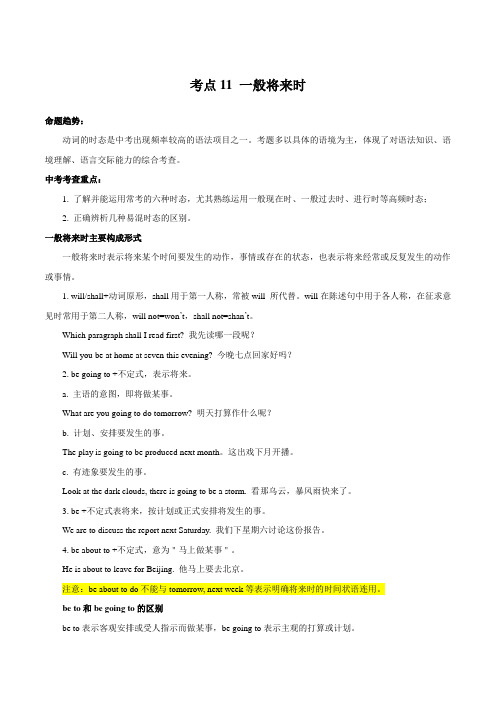
考点11 一般将来时命题趋势:动词的时态是中考出现频率较高的语法项目之一。
考题多以具体的语境为主,体现了对语法知识、语境理解、语言交际能力的综合考查。
中考考查重点:1. 了解并能运用常考的六种时态,尤其熟练运用一般现在时、一般过去时、进行时等高频时态;2. 正确辨析几种易混时态的区别。
一般将来时主要构成形式一般将来时表示将来某个时间要发生的动作,事情或存在的状态,也表示将来经常或反复发生的动作或事情。
1. will/shall+动词原形,shall用于第一人称,常被will 所代替。
will在陈述句中用于各人称,在征求意见时常用于第二人称,will not=won’t,shall not=shan’t。
Which paragraph shall I read first? 我先读哪一段呢?Will you be at home at seven this evening? 今晚七点回家好吗?2. be going to +不定式,表示将来。
a. 主语的意图,即将做某事。
What are you going to do tomorrow? 明天打算作什么呢?b. 计划、安排要发生的事。
The play is going to be produced next month。
这出戏下月开播。
c. 有迹象要发生的事。
Look at the dark clouds, there is going to be a storm. 看那乌云,暴风雨快来了。
3. be +不定式表将来,按计划或正式安排将发生的事。
We are to discuss the report next Saturday. 我们下星期六讨论这份报告。
4. be about to +不定式,意为"马上做某事"。
He is about to leave for Beijing. 他马上要去北京。
注意:be about to do不能与tomorrow, next week等表示明确将来时的时间状语连用。
人教版初中英语九年级Unit11知识点

人教版初中英语九年级Unit11知识点Unit 11: Making a DifferenceIn the ninth grade textbook of People's Education Press, Unit 11 revolves around the theme of "Making a Difference." This unit aims to help students understand the importance of taking actions to create positive changes in the world we live in. Here, we will explore some of the key knowledge points covered in this unit.Firstly, the unit introduces the concept of volunteering. It encourages students to actively engage in volunteer work to contribute to their communities. Volunteer work not only benefits the recipients but also provides personal growth and fulfillment. By participating in activities such as cleaning up the environment or caring for the elderly, students can learn valuable life skills such as teamwork, empathy, and responsibility.Next, the unit emphasizes the significance of education in making a difference. Education empowers individuals with knowledge and skills necessary to address various social issues. As students, it is crucial to recognize the importance of staying informed and educated about global events and ongoing challenges. By staying updated, we canactively participate in discussions, raise awareness, and propose possible solutions.In Unit 11, students are introduced to various environmental issues, such as pollution and global warming. They learn about the adverse effects of these problems on our planet, as well as the potential solutions and efforts being made to combat them. By gaining a deeper understanding of these issues, students can become more conscious of their own behaviors and adopt sustainable practices in their daily lives. For example, they can reduce water and energy consumption, recycle waste, and participate in tree-planting activities.Furthermore, the unit highlights the importance of empathy and compassion. Students are encouraged to put themselves in the shoes of others and develop a sense of empathy towards those who are less fortunate. By understanding the struggles of others, students can actively seek ways to help, such as participating in fundraising events for the underprivileged or donating essential items. Through these experiences, students can develop a sense of social responsibility and become more caring individuals.In addition to personal actions, the unit also introduces the concept of advocacy. Students learn about influential figures who have madesignificant contributions to society through their advocacy work. By studying the efforts of individuals like Malala Yousafzai and Greta Thunberg, students can gain inspiration and understand the power of their own voices. Encouraging students to speak up and advocate for causes they believe in can lead to meaningful change in their communities and beyond.Lastly, the unit emphasizes the importance of teamwork and collaboration. It highlights the idea that making a difference often requires collective efforts. By working together with classmates, friends, and family members, students can amplify their impact and achieve greater results. Whether it's organizing a charity event or initiating a social project, teamwork and collaboration are essential for achieving long-lasting change.In conclusion, Unit 11 of the ninth-grade textbook from People's Education Press provides students with valuable knowledge and concepts related to making a difference. By emphasizing volunteering, education, environmental awareness, empathy, advocacy, and teamwork, the unit encourages students to take action and contribute positively to society. By internalizing these key points, students can become informed global citizens who are capable of creating meaningful changes in the world around them.。
(必考题)初中英语九年级全册Unit 11知识点(答案解析)

一、选择题1.— Driving less and walking more is good for our health.—So I’d rather ________ an hour’s walk to work than consider ________ a car.A.take ;drive B.take ; to drive C.take; driving D.taking; driving C解析:C【详解】句意:少开车多走路对我们的健康有好处。
所以我宁愿走路一小时去上班也不愿意开车。
考查固定句型。
根据题目分析可知考查would rather do than do “宁愿做某事而不愿做某事”,因此第一空填take;consider doing “考虑做某事”,因此第二空填driving。
故选C。
2.Teachers ask us to remember that ______ careful we are, ______ mistakes we will make. A.the more; the fewer B.the fewer; the moreC.the more; the more D.the less; the fewer A解析:A【解析】【详解】句意:老师让我们记住我们越认真,我们犯的错误越少。
the + 形容词的比较级……,the + 形容词的比较级……“越……,越……”。
careful :仔细的,它的比较级more carful;more:更多的,many和much的比较级,修饰可数名词复数或不可数名词;fewer:更少的,修饰可数名词复数。
mistake是可数名词,故用fewer来修饰。
结合句意可知填the more; the fewer;选 A3.— Doctor, do you think I have got a bad cold?—Maybe. But I can’t say that before I ______ you.A.create B.warn C.examine D.prove C解析:C【解析】【详解】句意:——医生,你认为我得了重感冒吗?——也许,但在我检查你之前还不能确定。
上海钟山初级中学初中英语九年级全册Unit 11知识点总结(提高培优)
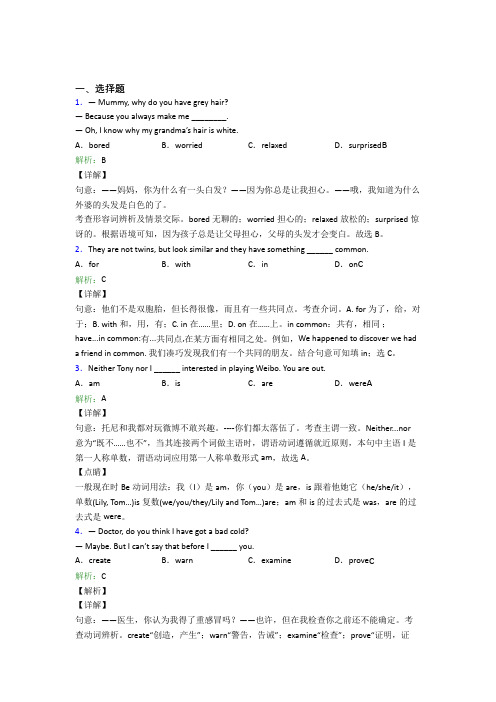
一、选择题1.— Mummy, why do you have grey hair?— Because you always make me ________.—Oh, I know why my grandma’s hair is white.A.bored B.worried C.relaxed D.surprised B解析:B【详解】句意:——妈妈,你为什么有一头白发?——因为你总是让我担心。
——哦,我知道为什么外婆的头发是白色的了。
考查形容词辨析及情景交际。
bored无聊的;worried担心的;relaxed放松的;surprised惊讶的。
根据语境可知,因为孩子总是让父母担心,父母的头发才会变白。
故选B。
2.They are not twins, but look similar and they have something ______ common.A.for B.with C.in D.on C解析:C【详解】句意:他们不是双胞胎,但长得很像,而且有一些共同点。
考查介词。
A. for为了,给,对于;B. with和,用,有;C. in在……里;D. on在……上。
in common:共有,相同;have...in common:有...共同点,在某方面有相同之处。
例如,We happened to discover we had a friend in common. 我们凑巧发现我们有一个共同的朋友。
结合句意可知填in;选C。
3.Neither Tony nor I ______ interested in playing Weibo. You are out.A.am B.is C.are D.were A解析:A【详解】句意:托尼和我都对玩微博不敢兴趣。
----你们都太落伍了。
考查主谓一致。
Neither...nor意为“既不……也不”,当其连接两个词做主语时,谓语动词遵循就近原则,本句中主语I是第一人称单数,谓语动词应用第一人称单数形式am,故选A。
中考英语知识点讲解 (11)

2. be against doing sth. “反对做某事”。如: I’m against doing anything till the police arrive. 我反对在警察到达之前采取任何行动。
3. against表示“靠着”“顶着”“迎着”“衬着”等。如: He stood with his back against the door. 他背靠门站着。 He hit his head against the window. 他的头撞到了窗户上。 It is difficult to see anything against this bright light. 对着这种强光很难看到任何东西。 Bright red flags flow in the wind against the blue sky. 鲜艳的红旗映衬着蓝天迎风飘扬。
2. remind sb. to do sth. “提醒某人做某事” Please remind me to finish my work. 请提醒我完成工作。 Be sure to remind her to come back early. 一定要提醒她早点回来。
3. remind sb. + that从句 He reminded me that I should answer the letter as early as possible. 他提醒我尽早回信。 May I remind you that time will soon be up? 我能提醒下你吗?时间快到了。
考点 3
forget是忘记,不再把某事放心上,忽视、 忽略的意思;leave是遗忘、丢下的意思。
1. forget的一般用法是:forget sth./sb. “忘记某事/ 某人”, forger to do sth.“忘记去做某事”或 forget doing sth.“忘记曾做过某事”; leave的一般用法是:leave sth.+介词+ sp. “ 把某物忘在某地” 。如: I forget to bring my book. I left my book at home.
南京市初中英语七年级下册Unit 11知识点(含解析)

一、选择题1.— was your vacation?— It was great.A.Where B.How C.What D.When B解析:B【详解】句意:——你的假期怎么样?——很棒。
考查特殊疑问词。
Where哪里;How怎么样;What什么;When什么时候;根据回答“It was great”可知,这里问假期过得怎么样,应用how提问,故选B。
2.Be quiet, children. I can’t _______ your father.A.listen B.hear C.see D.look B解析:B【解析】句意:孩子们,保持安静。
我听不见你父亲的声音。
A. listen强调听的过程;B. hear强调听的结果;C. see看见,强调看的结果;D. look看,强调看的过程。
根据前半句“孩子们,保持安静”,可以推出后半句句意为“我听不见你父亲的声音”,可知是表示听到的结果,故答案选B。
3.Mary likes drawing very much. Her _______ are very good.A.books B.songs C.photos D.paintings D解析:D【解析】句意:玛丽非常喜欢画画,她的画很好。
A. books书;B. songs歌曲;C. photos照片;D. paintings绘画。
根据前面“玛丽非常喜欢画画”,可知此处为“她的画很好”,结合选项,可知D选项符合题意,故答案选D。
4.My brother taught me _______ to make a model plane yesterday.A.what B.how C.where D.why B解析:B【解析】句意:昨天,我哥哥教我怎样制作一个飞机模型。
A. what什么;B. how怎样;C. where哪里;D. why为什么。
本题考查疑问词+不定式的用法,how+不定式做teach的宾语,teach sb.how to do sth.教给某人如何做某事,故答案选B。
- 1、下载文档前请自行甄别文档内容的完整性,平台不提供额外的编辑、内容补充、找答案等附加服务。
- 2、"仅部分预览"的文档,不可在线预览部分如存在完整性等问题,可反馈申请退款(可完整预览的文档不适用该条件!)。
- 3、如文档侵犯您的权益,请联系客服反馈,我们会尽快为您处理(人工客服工作时间:9:00-18:30)。
8 exhibition n (举行)art exhibition 9 一个艺术家
9 找到一份兼职工作. a (全职) job.
10 The doctor’s (救了)many people’s (命)He (节省了)the rest of the food for tomorrow / his son. I’m (节省)money for a bike.
11在同时,the moment,this/ that time
a moment , 有时(两种)
16.hold过去式过分 a meeting/ an examination
12.yet ,already 区别
Eg: They haven’t come back . Have you finished your homework ?
13 There is a bridge (在…上) the river. Winter is (结束)
14.fit adj. 比较级. Keep (健康), study well and work well.
fit v. 过去式过分
15 外国人
16 teach taught taught I teach (我)English.
He taught me how (游泳)I teach (我)to play
the piano.
17 .build过去式过分
18 (在)a loud(high) / low / soft voice. She has a (please)voice.
19 make a lot of (吵闹)20 时装展展览(两种)
21 show v. 过去式过分show sb. someplace.
Unit 11 Could you please clean your room?
1 做家务
2 洗餐具
3 一盘肉
4 weep过去式过分the floor.
5 trash n. (u) = rubbish = litter= junk= waste (倒)the trash.
He took his wallet out his bag.
6 铺床
7 room =sitting room
8 (在)the meeting. (参加)the meeting.
9. work hard ……. 努力工作去上班
10 can I keep the book? I have (借)the book for two days.
11 invite v. 名词Thank you for your = Thank you for me.
12 照顾(两种)
13 feed 过去式过分腻了, 厌烦.
14 disagree 不是否定词,只是否定意. Eg: He disagreed you,
he ?。
